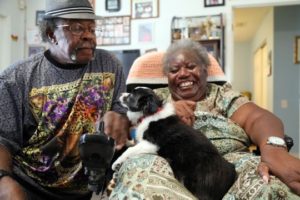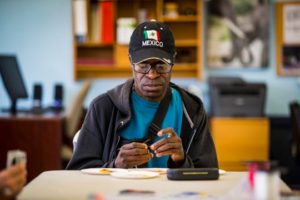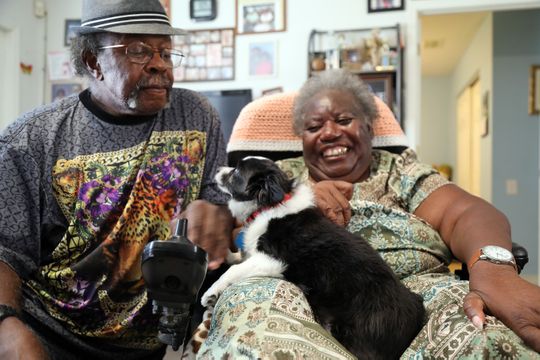Patricia Borns, Fort Myers News-Press Published March 28, 2019
Mouth-watering smells wafted from the oven as Eddie Clemons basted a roasting chicken while his wife Martha knitted at the dining room table.
In their 60s, from hard beginnings, the Clemonses lucked into a lifetime of paid employment, a happy marriage, a car and a home — an American dream out of reach for most disabled people in Southwest Florida, or Florida for that matter, because of miserly state funding.
“Florida’s Medicaid waiver reimburses only 54 cents on the dollar for supportive services,” said Angela Katz of LARC, a Fort Myers nonprofit offering life-enhancing programs for the disabled since 1954.
“When families call us, I encourage them to apply for the services, even though the waiting list can be 15 years long,” Katz said.
Over 700 people in the five-county area that includes Lee and Collier are waitlisted, she said. Without the waivers, families must pay for services out of pocket or do without.
The dark ages of disability

Eddie and Martha Clemons at home in Fort Myers.. The Clemonses bought the Habitat for Humanity home with assistance from LARC, a Fort Myers non-profit dedicated to the disabled, and savings from their jobs. (Photo: Patricia Borns/The News-Press)
When the Clemmonses were growing up, kids in Lee County with IQs lower than 50 could not attend public school. So concerned Lee parents founded LARC to help their loved ones live their best lives.
America was still practicing eugenics when the first LARC programs opened in a Fort Myers Sunday school classroom.
LARC: 64 years of helping developmentally, intellectually challenged reach their potential
“People called us retarded,” remembered Martha Clemons, who had been stricken with polio in the days before vaccines. “They would push me down. There was so much violence.”
The nonprofit — whose name long ago changed from Lee County Association for Retarded Citizens to Lee County Association for Remarkable Citizens — set her and Eddie free.
“I was a bitty thing running around the streets,” said Eddie, who had been abandoned by his parents and court-ordered to Sunland, a now-defunct institution with centers across Florida, known for its cruelty and neglect.
As the institutions closed, he entered LARC’s janitorial training program, working for the Lee County School District until retirement. He still works part-time cleaning for McDonald’s.
Martha Clemons also trained at LARC and held a data entry job until she retired.
With their savings and LARC’s help qualifying for a mortgage, the couple bought a home from Habitat for Humanity.
The price of low wages
But it takes people like Pamela Jenkins, LARC’s support services director, to make this independent lifestyle possible, helping the Clemonses with money management, doctor’s appointments – every aspect of their home lives.
“I am their lifeline,” Jenkins said.
Unfortunately, there aren’t enough like her to go around.
Because of low Medicaid reimbursement and wages, only 14 LARC clients including the Clemonses can receive the support they need to be fully integrated in the community, Jenkins said.
LARC Executive Director Kevin Lewis said he recently lost one of his staffers to Walmart because at $10.30 an hour, a personal support job doesn’t come close to a living wage.
“She was offered $12.50 to stock shelves,” Lewis said. “I completely understood.”
The state’s Medicaid long-term care waiver – the funding mechanism for disabled services – is so minimal that 50,000 people were on a waiting list as of August 2018, the Florida Department of Elder Affairs reported.
It’s the longest waiting list in the country, say advocacy groups who filed a 2018 class action claiming Florida is steering disabled people to nursing facilities.
Yet it costs only $29,215 a year to help someone like Eddie Clemons live independently, compared with $147,460 a year to institutionalize him, according to the Florida Developmental Disabilities Council.

Joe with his sister, Ann, has enjoyed coming to LARC for over 60 years. He likes to make money and learning to do the different jobs. His sister said LARC has changed his life. LARC has been supporting disabled people for over half a century, overcoming funding cuts and social stigma to do so. (Photo: Andrea Melendez/The News-Press/USA Today)
Ann Gaddis’ brother Joe Raby has been coming to LARC’s sheltered workshop since their parents joined with the other founding families.
The now-five-acre campus near downtown Fort Myers supports 50 businesses who outsource their work to Raby and other LARC workers. They do everything from engraving to building palettes to assembling products that might require a proprietary process that can only be accomplished by hand.
“There has never been a day in Joe’s life that he wanted to be anywhere else,” Gaddis said. “This is the happiest corner in Fort Myers.”
Asked what keeps him coming to the workshop – Raby is 76 now – he pulled a roll of bills from his trouser pocket.
The wages can vary widely. Since the 1930s, a 14c3 waiver has allowed employers to pay disabled people a sub-minimum wage based on how much they accomplish relative to their able bodied counterparts.
An employer can tie the wage to how much an able-bodied person produces in a given period based on a time study,, and pay the disabled person accordingly. For instance, if the standard to assemble a printed circuit board is 8 units per hour at $11 an hour and the disabled person does one board, their hourly pay could be $1.38.
By this method, some could make pennies an hour.
Although acceptable in Florida, a few states have banned the waiver, requiring a minimum wage for all. (A bill before Congress that would stop allowing waivers altogether is considered unlikely to pass.)
And some employers are providing the supports needed for disabled people to do their jobs in the work place instead of in a segregated workshop environment.
When bidding on projects that will employ his clients, “Our goal is minimum wage or more,” LARC’s Lewis said.
Still, of the roughly 34 percent of Americans with disabilities who are employed, most are in sheltered workshops earning around $2 an hour, critics of the waiver say.
Gaddis, though, sees a glass half full. With Medicaid benefits and his paycheck, Raby lives independently with a caretaker in Cape Coral, and is self-supporting.

Kevin Hardy, of Lehigh, enjoys working at LARC as well as work out in the community. Hardy is also a quietly remarkable artist. LARC’s day program for adults with disabilities. LARC has been supporting disabled people for over half a century, overcoming funding cuts and social stigma to do so. (Photo: Andrea Melendez/The News-Press/USA Today)
“The ugly reality was that if you had a child who wasn’t normal, you kept them in the back bedroom,” she said. “Joe has had a good life. He’s been a Special Olympics bowler. He loves music. There’s so much for him.”
At the Clemons home, Martha takes up a textile handbag in progress and begins to knit; a skill she honed at LARC.
“I love knitting. I make tote bags and pocket books,” she said. “I want to sell them.”
Pictures frame a living room wall: the happy couple on their wedding day; awards for outstanding performance on the job; a trip to Tallahassee to advocate for disabled people’s rights.
“It was my first time on an airplane,” she said. “I met the president.” It was George Herbert Walker Bush, under whom the Americans with Disabilities Act became law in 1990.
Unlike the able-bodied world around them, the Clemonses inherently know they are as good as anyone.
“It doesn’t bother me,” Martha said of the specialized braces she wears that become her legs. “People look at me and say God bless you, you’ve got a beautiful smile, and I say God bless you, too.”
Asked what needs to change for people with disabilities, she didn’t hesitate:
“They need money to grow,” she said. “Money to pay for the bus and school to open up their lives and follow their dreams.”
Follow this reporter on Twitter @PatriciaBorns.
LARC by the numbers
From its five-acre Fort Myers campus, LARC provides adult training, community living skills, vocational opportunities and other supportive services to some 300 disabled Southwest Floridians annually, according to its 2017 tax form.
Fifty business partners outsource work to LARC, providing paid employment opportunities on its five-acre Fort Myers campus.
From those contracts, the nonprofit employed 250 people and paid out over 45,000 hours in wages to sheltered workshop participants in 2018.
Another 37 companies hired disabled personnel directly in their workplaces..
Through its adult day programs, LARC provided 23,892 days of adult training in 2018.
Its revenue in contributions and grants totaled $2.3 million in 2017 and $11.3 million since 2012. Major funders include United Way of Lee County and Lee County Human Services, among others.
LARC’s vocational staff brought in $211,000 in service revenue in 2017.
The nonprofit paid out $1.9 million in salaries to 169 employees in 2017, and cleared $32,000 in total revenue after expenses.
The LARC campus is located at 2570 Hanson Street in Fort Myers.
For more information call (239) 334-6285.


Comments are closed.